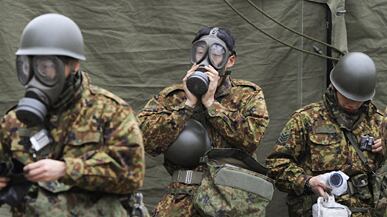There is something perversely gratifying about Ron Rosenbaum’s pessimism on the question of nuclear war. Yes, he writes, a nuclear bomb will again be detonated in an act of war. The only uncertainty is whether it will happen within a couple of decades or before his book appears in paperback.

The pessimism of How the End Begins: The Road to a Nuclear World War III is refreshing because over the last 20 years the public discussion of nuclear warfare has diminished in candor and volume in almost exact correlation to the likelihood that a nuclear Armageddon will occur. Pakistan and North Korea have now detonated bombs. Iran was expected to have a bomb as early as 2012 until nearly 20 percent of its nuclear centrifuges were wiped out in a “ sophisticated cyberattack” (likely conducted by Israel with the U.S.’s complicity). The Iranian bomb now appears to be on target for 2015. The possibility that a terrorist organization might obtain a nuke is higher than ever. And the U.S. and Russia still have thousands of nuclear missiles, on active alert, aimed at each other. These are the types of scenarios that would make the current catastrophe in Sendai look piddling by comparison.
Reading about all of the ways in which human or mechanical error could lead to nuclear genocide, I was reminded of a boy named Raoul in my high school who played a parlor game each day during lunch period. He would draft an email addressed to the head of school, the entire faculty, and the student body. In the letter he wrote the most obscene things imaginable about various teachers and popular students—a kind of high-school version of The Aristocrats. Finally, Raoul moved the cursor to “Send” and held his finger a millimeter over the mouse, making a delirious high-pitched noise (it sounded something like “ Eeeeeeeeeee…”), while his terrified friends begged him to move his finger and delete the draft. Raoul’s letters became increasingly depraved, and the routine became ever more excruciating, until one day an upperclassman accidentally backed into Raoul and the email was fired off. (Now 30, Raoul lives at home with his mother and is looking for a job.) The thousands of nuclear bombs on alert in the U.S. and Russia are in a similar situation. Behind each trigger sits a soldier, only a few years older than Raoul.
When the bomb finally is launched—whether by Iran, Pakistan, Russia, or some stateless terrorist organization—do we retaliate?
There is no better example of the human capacity for denial than our complacency about nuclear bombs. A recent example of the current level of public discourse came earlier this year, during the surreal debate over the New START Treaty. Republicans objected strenuously that the reduction should be avoided unless it was paired with “enhancements” to the remaining nuclear warheads, and Democrats were accused of undermining national security. But the treaty is hardly pacifist. It calls for a reduction of nuclear warheads from 2,200 to 1,550, which is still 1,550 times the number of nukes needed to blow up Washington, D.C., or Moscow.

Rosenbaum explains, in terrifying detail, how little the nuclear jousting between the two superpowers has changed since the Cold War. In August 2007 Vladimir Putin announced that Russian long-range bombers were resuming regular “strategic flights.” In nuclear jargon, “strategic” means “equipped with nuclear weapons.” Since then, Russian fighter jets, nuclear bombs dangling from their wings, have been regularly flying toward U.S.-Canadian airspace. Whenever they get too close, American pilots scramble to intercept them, meaning our planes fly at their planes, as in a game of chicken.
How did we get here? Or rather, why are we still here? Part of the trouble, Rosenbaum argues, is linguistic. Ever since our species learned how to make ourselves go extinct, we’ve taken great pains to avoid talking about it. Nuclear jargon has evolved into a code that is indecipherable to the layman. The terms are purposefully confusing, and often contradictory. “Damage limitation,” for instance, means “launching a nuclear bomb before the other guy can.” Civilian populations who are at risk of being annihilated by a bomb are referred to as “economic infrastructure.” “Inadvertence” means the accidental launching of a bomb (as in, “Oh dear. Very sorry about that inadvertent strike at your economic infrastructure.”). The problem with nuclear language is not that it understates the horror of the weapons. That, after all, is unavoidable. Man’s technological innovation has outpaced his linguistic abilities. There seem to be more scientists capable of designing a nuclear bomb than writers capable of describing the suicide of the species (Ray Bradbury’s “There Will Come Soft Rains” comes closest).
The real problem with the vagueness of nuclear language is that it can lead to serious misunderstanding and potentially catastrophic policy. An astonishing example is the 2007 National Intelligence Estimate on Iran’s nuclear program. After years of documenting Iran’s effort to acquire nuclear weapons, the NIE in 2007 seemed to have reached a new conclusion. The report stated: “We judge with high confidence, that in fall 2003, Tehran halted its nuclear weapons program.” This was quoted on front-page headlines across the globe. The trouble with the sentence, besides the misplaced comma, was that “nuclear weapons program” did not, in fact, mean “nuclear weapons program.” A footnote, ignored by the world, clarified: “by ‘nuclear weapons program’ we mean Iran’s nuclear weapons design.” In other words, Iran was no longer focusing on weapon design, but it was continuing to work on uranium enrichment and long-range missiles. Its nuclear program was right on course. This bit of semantic confusion, writes Rosenbaum, weakened the international effort “to halt by peaceful means—through sanctions—the Iranian nuclear weapons program by misleading the entire world into thinking it had already been halted.” It’s hard to think of a more damaging example of bad writing in the history of mankind.
Rosenbaum himself struggles to find the best way to describe the absurdity of the nuclear situation. The early chapters, in which he outlines every possible thing that can go wrong, are a prose panic attack. But it’s hard to blame him. The facts haven’t been well reported. The news is bad. And it’s about to get much worse.
Rosenbaum distinguishes between the first, bipolar nuclear age and the second nuclear age, in which nuclear technology has spread to numerous states. Looking back at the 20th century, nuclear advocates argue that the deterrent of the bomb had a stabilizing effect. We have, after all, avoided a third World War for nearly 70 years now. But even many of the most prominent Cold War nukeheads—Henry Kissinger, George Schultz, Richard Burt, Sam Nunn—have argued that this logic no longer stands. The bomb is now a force of destabilization. Bombs are more likely to fall into the hands of suicidal maniacs who have no fear of retaliation. The trend points quite clearly toward disorder, chaos, extinction.
The nuclear question needs to be rephrased: when the bomb finally is launched—whether by Iran, Pakistan, Russia, or some stateless terrorist organization—do we retaliate? Is there a scenario in which nuclear retaliation would be moral? Rosenbaum’s answer is a definitive no. Any reader of this upsetting book will be convinced that he’s right. Let’s pray that the man with his finger hovering over the launch button agrees. Eeeeeeeeeeeeee…
Nathaniel Rich is the author of The Mayor's Tongue. He lives in New Orleans.






